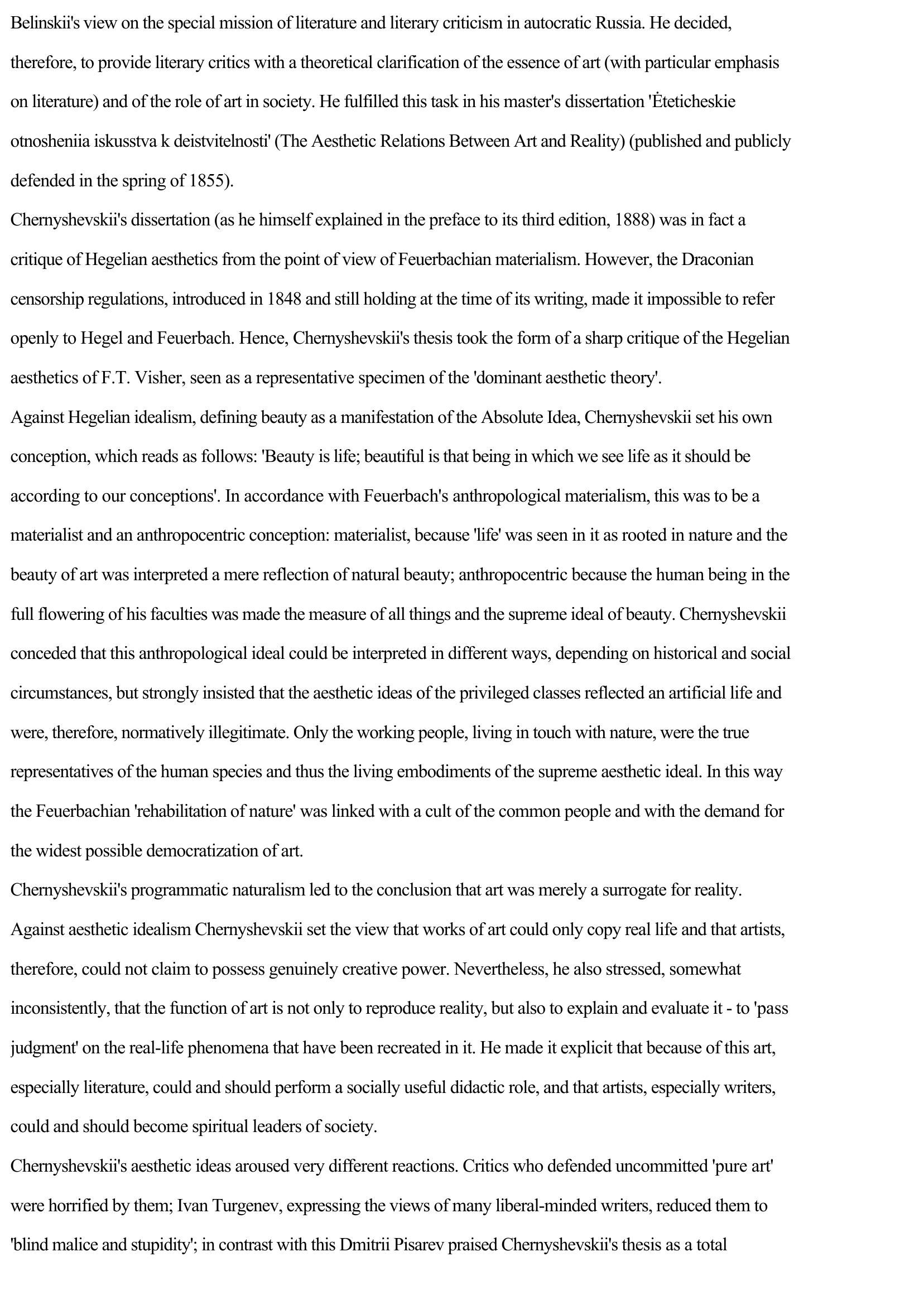Chernyshevskii, Nikolai Gavrilovich
Publié le 25/02/2010

Extrait du document
Nikolai Chernyshevskii was the main theorist of the Russian democratic radicalism of 'the 1860s' or, more precisely, of the period of political 'thaw' and liberal reforms which followed Russian defeat in the Crimean War and the enthronement (in 1855) of Alexander II. He was also the best representative of the non-conformist elements among the raznochintsy, that is, the educated commoners, who at that time began to figure prominently in Russian intellectual and social life. As such, he exerted a powerful formative influence on the Russian intelligentsia. In 1862 Chernyshevskii was arrested, brought to trial and, despite insufficient evidence, condemned to lifetime banishment in Siberia. In exile, preserving his integrity to the end, he stoutly refused to ask for clemency (as a result, he remained in a remote Siberian village until 1883). In prison, waiting for trial, he wrote the novel Chto Delat' (What Is To Be Done?) in which he showed the 'new men' of Russia - 'rational egoists', devoted to the cause of progress, and even a type of ascetic, self-sacrificing revolutionist. Thanks to a strange oversight of the censor the novel was serialized in the journal Sovremennik (The Contemporary) and, despite lack of literary distinction, became a powerful source of inspiration for several generations of Russian progressive youth.
«
Belinskii's view on the special mission of literature and literary criticism in autocratic Russia.
He decided,
therefore, to provide literary critics with a theoretical clarification of the essence of art (with particular emphasis
on literature) and of the role of art in society.
He fulfilled this task in his master's dissertation 'Ė teticheskie
otnosheniia iskusstva k deistvitelnosti' (The Aesthetic Relations Between Art and Reality) (published and publicly
defended in the spring of 1855).
Chernyshevskii's dissertation (as he himself explained in the preface to its third edition, 1888) was in fact a
critique of Hegelian aesthetics from the point of view of Feuerbachian materialism.
However, the Draconian
censorship regulations, introduced in 1848 and still holding at the time of its writing, made it impossible to refer
openly to Hegel and Feuerbach.
Hence, Chernyshevskii's thesis took the form of a sharp critique of the Hegelian
aesthetics of F.T.
Visher, seen as a representative specimen of the 'dominant aesthetic theory' .
Against Hegelian idealism, defining beauty as a manifestation of the Absolute Idea, Chernyshevskii set his own
conception, which reads as follows: 'Beauty is life; beautiful is that being in which we see life as it should be
according to our conceptions' .
In accordance with Feuerbach's anthropological materialism, this was to be a
materialist and an anthropocentric conception: materialist, because 'life' was seen in it as rooted in nature and the
beauty of art was interpreted a mere reflection of natural beauty; anthropocentric because the human being in the
full flowering of his faculties was made the measure of all things and the supreme ideal of beauty.
Chernyshevskii
conceded that this anthropological ideal could be interpreted in different ways, depending on historical and social
circumstances, but strongly insisted that the aesthetic ideas of the privileged classes reflected an artificial life and
were, therefore, normatively illegitimate.
Only the working people, living in touch with nature, were the true
representatives of the human species and thus the living embodiments of the supreme aesthetic ideal.
In this way
the Feuerbachian 'rehabilitation of nature' was linked with a cult of the common people and with the demand for
the widest possible democratization of art.
Chernyshevskii's programmatic naturalism led to the conclusion that art was merely a surrogate for reality.
Against aesthetic idealism Chernyshevskii set the view that works of art could only copy real life and that artists,
therefore, could not claim to possess genuinely creative power.
Nevertheless, he also stressed, somewhat
inconsistently, that the function of art is not only to reproduce reality, but also to explain and evaluate it - to 'pass
judgment' on the real-life phenomena that have been recreated in it.
He made it explicit that because of this art,
especially literature, could and should perform a socially useful didactic role, and that artists, especially writers,
could and should become spiritual leaders of society.
Chernyshevskii's aesthetic ideas aroused very different reactions.
Critics who defended uncommitted 'pure art'
were horrified by them; Ivan Turgenev, expressing the views of many liberal-minded writers, reduced them to
'blind malice and stupidity'; in contrast with this Dmitrii Pisarev praised Chernyshevskii's thesis as a total.
»
↓↓↓ APERÇU DU DOCUMENT ↓↓↓
Liens utiles
- OMBRE D’UN AMI (L’) (Résumé et analyse) Nikolai Semionovitch Tikhonov
- Grundtvig, Nikolai Frederik Severin - religieux.
- Grundtvig, Nikolai Frederik Severin - éducation & enseignement.
- Figure Skating: Olympic Gold Medalists Year Name Country Men's Individual 1908 1 Nikolai Panin Russia 1908 Ulrich Salchow Sweden 1920 Gillis Gräfsröm Sweden 1924 Gillis
- Berdiaev, Nikolai Aleksandrovich

































